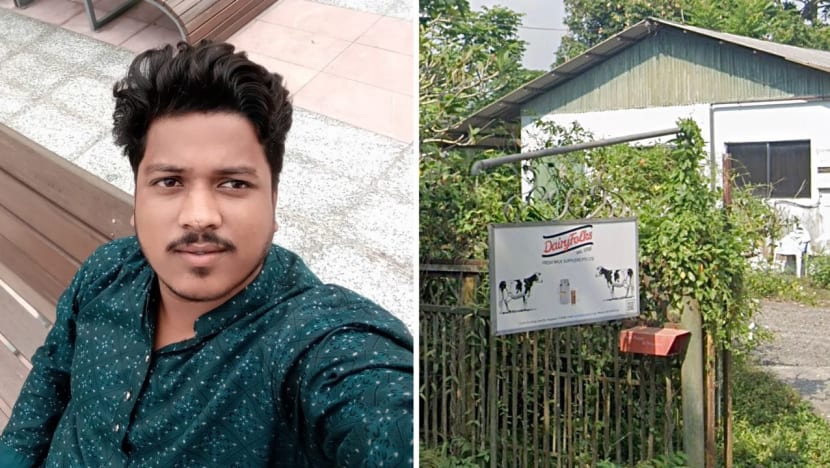He paid S$7,000 to work in Singapore, but found himself without a job or a home
After the agent stopped paying his rent, Mr Jaynal spent days sleeping in a park near City Square Mall.

The Bangladeshi migrant worker was promised a job at DairyFolks Fresh Milk Suppliers by an agent. (Photos: Jaynal MD, screengrab from Google Maps)

This audio is generated by an AI tool.
SINGAPORE: Jaynal MD had high hopes about coming to Singapore.
A job here meant he would earn triple the 28,000 Bangladeshi taka (US$240) he made a month in Bangladesh.
Though sad to leave his two young children behind, he thought it was worth it to give them a better life.
But what the 25-year-old did not know was that he would be stuck in limbo months down the road, with no job and at times, no roof over his head.
WHAT HAPPENED
Back in his village in the Narayanganj district in Bangladesh, Mr Jaynal drove an auto-rickshaw, also known as a tuktuk, for a living. The money he makes from this – a job he secured having only studied until Primary 4 – goes to provide for his family of seven.
In February this year, a friend of his father told him about an agent who helped three of his fellow village men secure jobs at a dairy farm in Singapore.
Mr Jaynal was told the same company, DairyFolks Fresh Milk Suppliers, was looking for another worker. He would be paid S$1,000 a month (US$740).
"I was very hopeful and happy … that I was going to get such an increase in my salary," Mr Jaynal told CNA through a Bengali translator. His family was equally enthusiastic.
Convinced to take up the offer, Mr Jaynal began communicating with the agent, who was in Singapore, over WhatsApp.
The agent did not tell him much about the job; only that he would be working on a farm. The agent also gave him a digital copy of an in-principal approval letter, which is needed to bring migrant workers into the country.
The agent said "everything would be solved and fixed" after he arrived in Singapore, Mr Jaynal recounted.
He was also told he had to pay 800,000 Bangladeshi taka – about S$9,200 – to secure the job. Of this, he had to pay the equivalent of almost S$7,000 before he came to Singapore.
In the month leading up to his arrival, he sold his rickshaw to buy a flight ticket. He also took out bank loans to get the cash he needed, which he handed over to the agent's brother in Bangladesh.

NO UPDATES FOR MONTHS
Mr Jaynal arrived in Singapore in early March. He recalled landing in the early hours of a Thursday, with no sign of the agent at the airport.
After repeated calls, he finally got through to the agent and was told to meet at department store Mustafa Centre in Little India.
Once they met, the agent brought him to a house he had rented near City Square Mall, where Mr Jaynal would live with other migrant workers.
Things were smooth sailing in the beginning. Mr Jaynal did not think twice when the agent collected his medical records and fingerprints, saying they were needed for his job.
But as time ticked on, he began feeling uneasy; he had received no updates about the job for almost two months. Whenever he questioned the agent, the reply was that the process "takes time".
One day, when Mr Jaynal was out with some friends, he received a call from the agent who told him that he was going "someplace". By the time Mr Jaynal returned to his accommodation, the agent was gone.
He learnt from another worker, who was also living at the house, that the agent had returned home to Bangladesh.
"I felt very upset. I was thinking of my family; that I won’t be able to feed them. I was kind of losing hope," Mr Jaynal said.
KICKED OUT OF ACCOMMODATION
After the agent’s departure, Mr Jaynal was asked to leave his accommodation as the agent had stopped paying his share of the rent.
His belongings were dumped near a rubbish bin, and although he managed to retrieve some items, his passport was gone.
Stranded in an unfamiliar country where he could not speak the language, Mr Jaynal took refuge at a park near City Square Mall. For about five days, the park was his home.
He occasionally returned to the house for meals, he told CNA. His former housemates, who were understanding about his situation, welcomed him to stay for a couple of hours each day.
Mr Jaynal later temporarily stayed with an acquaintance from his hometown, whom he had met through Facebook. The acquaintance advised him to seek help from the Ministry of Manpower (MOM).
Mr Jaynal said he was told that he would need a work permit from DairyFolks Fresh Milk Suppliers. But no one was around when he went down to the farm located at Lim Chu Kang.
It was also during this visit that he met the three workers from his village who had been employed by the company, and got wind of the salary issues they were facing. All three had not received their full salaries for almost six months.
They told him to contact Ripon Chowdhury, a migrant worker who is also the founder of community organisation Migrant Workers Singapore.
Mr Chowdhury, who had spoken to the three workers about their salary issues, connected Mr Jaynal to non-profit organisation Transient Workers Count Too (TWC2). The non-governmental organisation agreed to house Mr Jaynal temporarily.
AUTHORITIES INVESTIGATING
While he was at TWC2’s shelter, Mr Jaynal said MOM contacted him and arranged for a meeting with his employer's son.
During the meeting, the employer’s son said "this was all a scam" and that the company had only asked the agent for three workers, Mr Jaynal recounted.
The employer’s son declined to comment when contacted by CNA.
Employment agencies are required to obtain employers' written consent prior to submitting work permit applications and must declare this as part of the application process.
The ministry told CNA it is investigating the claim that the company was not aware of Mr Jaynal's work permit application. MOM said it has also contacted Mr Jaynal to provide assistance and to check on his well-being.
It also instructed the company to arrange for a place to stay for Mr Jaynal. He stayed there for a few days before relocating to another accommodation provided by MOM.
WHAT NEXT
Mr Jaynal has been informed that he is allowed to look for a new employer, and the ministry said it has linked him up with the Migrants Workers’ Centre to support his job search.
The Tripartite Alliance for Dispute Management is also helping the other three migrant workers with their salary claims and has set up mediation sessions between the workers and the company.
Mr Jaynal told CNA that he was given a list of agents to contact for jobs. But he hasn't heard back from any of them, and he is losing hope.
He said the whole situation has left him "confused". "Maybe they’ll just make me stay for a few days and deport me back," he said wearily.
But he is determined to work in Singapore or at the very least, get back the money he has paid.
"Even if it’s 200,000 or 300,000 taka … At least it’s something so (I) won’t return home empty-handed."



















